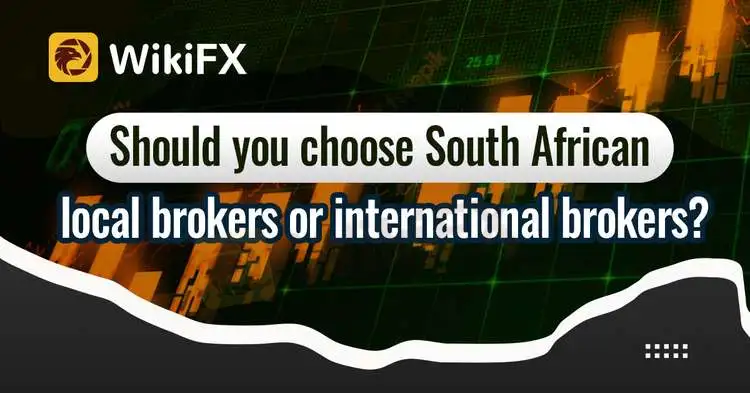简体中文
繁體中文
English
Pусский
日本語
ภาษาไทย
Tiếng Việt
Bahasa Indonesia
Español
हिन्दी
Filippiiniläinen
Français
Deutsch
Português
Türkçe
한국어
العربية
Should you choose South African local brokers or international brokers?
Abstract:Many traders when they are still new to the forex industry, will tend to question this a lot. Most of traders usually follow their mentor’s footsteps or anyone who introduced them to the forex trading industry. It is so rare where we see an individual just choose their broker without being referred by someone or recommended by someone.

The truth is choosing a broker should be a very subjective matter, one should not choose or use a broker based on someone else‘s preferences. There are many factors that could affect the choice of your desired broker. Most of these successful traders that promote certain brokers are getting paid to do so, it is not so advisable to follow someone else’s footsteps without doing your own research.
In the past few years, the South African forex trading community grew rapidly, offering a vast of opportunities to people in our country. Some people were able to be full time traders and quit their jobs, some opened forex classes and some of the few big traders opened their own trading brokers. There is one broker of choice by Sandile Shezi who is charged with defrauding his business partner out R500 000.
The global forex institute by Sandile Shezi had ACM Gold broker as a broker of choice so they say, but this broker has had its license temporarily by the Financial Services Board. Recently we have seen a broker (FBK Markets) by Coach Kgopotso Mmutlane (DJ Coach), this broker is still new and there is not a lot that people say about it.
Factors to consider when choosing a broker.
1. Minimum deposit.
2. Spread.
3. Trading instruments.
4. Leverage.
5. Minimum withdrawal and withdrawal turnaround time.
6. Regulated or unregulated.
7. Ownership, history and reputation.
8. Currency used
9. Local or international
There are many good reasons that could make you choose a local South African broker. Withdrawals are going to be a little bit faster if you are local, there would not be any need of exchange in capital currency like in South Africa you can use the South African Rand (ZAR) as your capital or base currency. In that case you will not have to pay the exchange rate. A trader must be very careful when using a broker that has more hype than longevity, we have seen JPMarkets minor issues and we should learn from it.
The safest and most reliable place to check the eligibility of your broker or where you could do your research is at www.wikifx.com for more information. You will get a variety of legit forex brokers from any country, from their license, spread, leverage and many more news about a certain broker including the reviews and some other users experiences. There is also an app for your own convenience, where you could find more about brokers scams, rankings, the regulators, the stories about people who could not do their withdrawals and many more useful forex fundamentals that could help you from losing your hard-earned money and wise trading decisions.

Disclaimer:
The views in this article only represent the author's personal views, and do not constitute investment advice on this platform. This platform does not guarantee the accuracy, completeness and timeliness of the information in the article, and will not be liable for any loss caused by the use of or reliance on the information in the article.
Read more

Alleged Concerns with TradeEU.global's Trading Practices
An individual trader has come forward with allegations of an unfavourable experience while using the services of the broker TradeEU.global.

Lured by False Promises: Malaysian Driver Lost RM218K to an Investment Scam
A 49-year-old e-hailing driver in Malaysia fell victim to a fraudulent investment scheme, losing RM218,000 in a matter of weeks. The scheme, which falsely promised returns of 3 to 5 per cent within just three days, left the individual financially devastated.

Italian Regulator Warns Against 5 Websites
The Italian regulator, CONSOB has issued a warning against five websites offering unauthorized financial services. This regulatory action aims to protect the public from fraudulent activities.

Trader Exposes Unethical Practices by STP Trading
A recent allegation against STP Trading has cast doubt on the firm's business practices, highlighting the potential risks faced by retail traders in an increasingly crowded and competitive market.
WikiFX Broker
Latest News
Saxo & Portuguese Bank Partnership
SEC Fines Broker-Dealers $275K for Incomplete SAR Filings
What Makes Cross-Border Payments Easier Than Ever?
Trader Exposes Unethical Practices by STP Trading
Lured by False Promises: Malaysian Driver Lost RM218K to an Investment Scam
FTX Sets March 2025 Timeline for Creditor Payouts: What It Means for Investors
What is an Economic Calendar? How it works
Italian Regulator Warns Against 5 Websites
Mastercard's 2030 Vision: Biometric-Driven, Tokenized Payments
SFC Freezes $91M in Client Accounts Amid Fraud Probe
Currency Calculator


